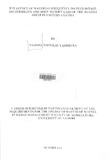| dc.description.abstract | This study was conducted at Kyerima village, Kitimbwa Subcounty, Mukono district,
eastern Uganda to determine the effect of watering frequency on water consumption,
feed intake, feed digestibility and body weight gain of local Nganda sheep. Sixteen, fourmonths
old male sheep, of approximately 16 kg each were purchased locally and housed
in individual pens in the same barn. The animals were randomly assigned to the
following four treatments (watering frequencies): (1) Ad-libitum water supply - water
available at all times (T1); (2) Once after 24 hour (T~) - animals watered for 30 minutes
every 24 hours; (3) Once after 48 hours (Ts) - animals watered for 30 minutes after 48
hours. (4) Once after 72 hoursf'Tj) - animals watered for 30 minutes after 72 hours.
The animals were subjected to a preliminary period of one month during which they
were fed on the experimental diet. The results showed that watering frequency had a
significant effect (P<0.05) on the amount of water consumed, dry matter consumed, dry
matter digestibility and body weight gain of the sheep. The sheep in treatment TI
consumed the greatest amount of water and feed followed by those under T~, T, and
T I, respectively. There was a linear positive relationship between water and dry matter
intake (RC!= 0.94). Likewise, there was a linear positive relationship between water
intake and dry matter digestibility (R~ = 0.86). The results showed a significant effect
(P < 0.05) of watering frequency on the body weight gain. There was also a linear
positive relationship between watering frequency and the body weight gain (R= 0.94).
TI sheep gained the highest weight followed by those under TC!,Ts and'Tj, respectively.
The results of this study strongly suggest that intermittent watering inversely impacts
the sheep in terms of the amount of water and feed they consume, their feed
digestibili ty and ul timatel y their performance. Hence, free access to water is the ideal
situation in which the sheep performance is highest. However, since free access to water IS not possible in arid and semi-arid lands, our results suggest that sheep should be watered at least once daily for better performance. | en |

